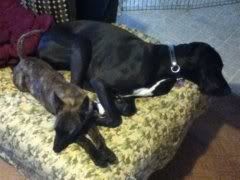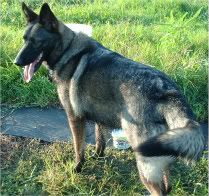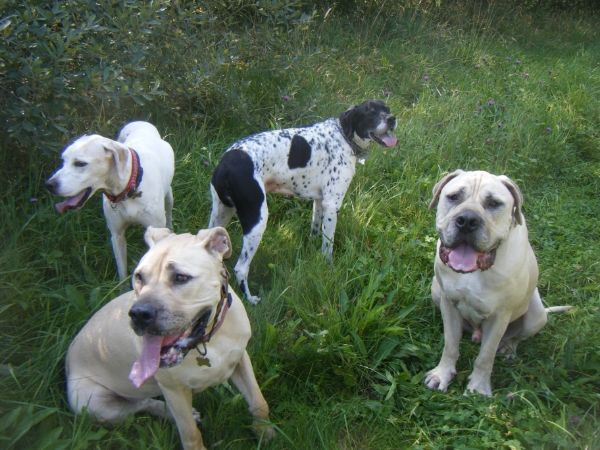 Defining Dominance
#355716 - 02/17/2012 01:47 PM Defining Dominance
#355716 - 02/17/2012 01:47 PM |
Webboard User

Reg: 07-17-2010
Posts: 1442
Loc: UK
 Offline Offline |
|
There are many and varied posts on the board here regarding people who think they own a dominant dog, and nearly all the replies and opinion doubt this is really what the dog is displaying.
There are also many breed specific information sites, (one of my own breeds, the Boerboel, being among them) who claim this is one of the traits of that breed, and caution is advised when considering either getting a pup, or an adolescent dog, because this is a dog that will require experienced handling.
When a novice to a 'dominant breed' then encounters problems with drivey and mouthy pups/young adults, and come here and ask the question, 9 times out of 10, it is proven the dog isn't dominant, and most likely it is a handler error; advice is given, and either the person has a 'light bulb' moment, or they are convinced their dog is dominant and go elsewhere for their information 
So what I wondered was, could someone define genuine dominance please?
|
 Top Top
|
 Re: Defining Dominance
[Re: tracey holden ]
#355737 - 02/17/2012 07:45 PM Re: Defining Dominance
[Re: tracey holden ]
#355737 - 02/17/2012 07:45 PM |
Webboard User

Reg: 11-23-2010
Posts: 817
Loc: St-Lazare, Qc
 Offline Offline |
|
Dogs are social animals like many others, they have picking order. I think that it is more a social ranking then dominance problem.
So a dog can "act dominant" with one handle and change totaly for an other. The handler presence can influence the dog.
Again I have limited experience with dogs but with horses I see it a lot. A horse can be the sweetess easy going one and becomes a pushy resistant argumenting monster when a different person try to ride it.
They find how to push someone buttons and the fun start when it work. If (dog or horse) can get an emotional response out of a person, this person is not a worthy leader for that (dog or horse). The same behavior on a different person does not create the same reaction the animal change what he will do.
So to me the real dominant on is the one that will try to get to the top even with the best of the best handler. It is a non agressive cool calm and collected dog. Any way in my horse world that would be the dominant one he wants to be number 1 regarless of who is handling or riding and the more qualified the person is the more he will try to get that person to react and won't give up easily but once he decide that number 2 is not so bad and that number 1 is fair and have his emotion under control. They are wounderfull to play with.

Lucifer! |
 Top Top
|
 Re: Defining Dominance
[Re: tracey holden ]
#355743 - 02/17/2012 10:33 PM Re: Defining Dominance
[Re: tracey holden ]
#355743 - 02/17/2012 10:33 PM |
Webboard User

Reg: 05-08-2008
Posts: 1473
Loc: Alaska
 Offline Offline |
|
Yep, a dominant one just is a leader type personality, their ideas are the best, and they don't necessarily get their way with aggression but cool collective calmness. They learn who is their boss and who is not...but always look for weakness. They may greet you with respect but turn and piss on the leg of another.
A dominant dog is not just exuberant, snappy/reactive or just pushy and drivey. I don't think that all food/object guarding is dominance, I have seen a submissive dog do it before...it was a lack of trust issue.
A tired dog is a good dog, a trained dog is a better dog. |
 Top Top
|
 Re: Defining Dominance
[Re: tracey holden ]
#355747 - 02/17/2012 11:38 PM Re: Defining Dominance
[Re: tracey holden ]
#355747 - 02/17/2012 11:38 PM |
Webboard User

  
Reg: 09-28-2009
Posts: 487
Loc: Alaska
 Offline Offline |
|
I'm assuming a dog could be dog-dominant but not human dominant. It is my experience that the vast majority of dogs want to work with people and are not out to dominate their human partners. We've bred them that way for 10,000 years. Depending on how exactly people define dominance, I'd think a truly 'dominant' type dog (to people) might usually end up euthanized and that over time, this behavior has essentially been bred out of the domestic dog gene pool.
A true 'dominance' would not even be desirable in an independent working dog like a Akbash or pyrenees. I can't imagine a stock owner would want a dog on his property that was unwilling to share his 'territory' with humans and would therefore 'dominate' (read attack) any human that ventured into his territory- including his owner. I know dogs are not wolves and I don't like comparing them generally, but wolf packs do not 'share' territory. They will kill outside wolves that venture into their territory. They will not simply posture or chase- although that could be the initial warning.
I've known nuetral, confident dogs that did not challenge their owners or act aggressively. They were happy filling the role of companion. How is confidence different from dominance?
Some 'dominant' dogs are simply aggressive. That aggression can be channeled with OB and bonding, but it is still aggression- not dominance. Where is the line between dominance and aggression?
|
 Top Top
|
 Re: Defining Dominance
[Re: tracey holden ]
#355748 - 02/17/2012 11:44 PM Re: Defining Dominance
[Re: tracey holden ]
#355748 - 02/17/2012 11:44 PM |
Webboard User

  
Reg: 09-28-2009
Posts: 487
Loc: Alaska
 Offline Offline |
|
I wanted to add, I don't think a dog that likes to think independently and thinks his ideas are the best ideas is necessarily a dominant dog.
He is only dominant if he decides to use aggression to enforce his ideas.
A siberian husky may think his ideas are the very best ever and not care at all what the human says- but in my experience, this breed is generally non-aggressive.
I also know of lead sled dogs that were very stubborn and didn't want to take directional commands at first. They were some of the best lead dogs once they decided to listen to the musher. BUT they didn't have a physical show down of aggression vs. might with the musher. It was a matter of mutual respect. Libby Riddles (first woman to win Iditarod) had some battles of the wills while training her best lead dog. But no 'choking off' or teeth were involved. It was a mental/bonding/respect deal.
Is this dominance?
|
 Top Top
|
 Re: Defining Dominance
[Re: tracey holden ]
#355749 - 02/18/2012 01:05 AM Re: Defining Dominance
[Re: tracey holden ]
#355749 - 02/18/2012 01:05 AM |
Webboard User

 
Reg: 05-25-2011
Posts: 439
Loc: Lawton, OK
 Offline Offline |
|
Ok, I'll give it a shot, and of course this is all imo. I think that a truely "dominant" dog is a very rare thing, and can be defined as one with the desire to lead above all else. Every dog is capable of leading, but only to varying degrees.
With a level 10 being a "dominant" dog, leadership ability of the human "pack leader" comes into play. A level 5 dog with a level 4 human may display "dominance" to some degree because of the level of leadership they are receiving, but may choose to be indifferent because of the inherent desire to please.
A level 8 dog with a level 3 human can be a disaster because now the dog sees a weak leader and attempts to take control with "dominant" behavior, and even aggression. The dog sees the lack of proper leadership, and takes the steps to put everything into "proper pack harmony", even if it means giving the human a correction or to put their human in a lower ranking position in the pack.
There are many different factors in a dogs desire to lead, nerves, confidence, drive and intelligence seem to be the big four. A dog can be submissive with one human and "dominant" with another if the level of leadership drops below the level of the dog. If the leadership remains constant, or increases then the dog remains submissive or can even become more submissive, to a point.
Should you ever come across a level 10 dog, and your not a level 9-10 leader then it's going to be a constant battle for rank with challenges for leadership consistantly. You can still "make" the dog do what you want them to do, but they're not going to be comfortable with it, and may be down right obstinant.
Now this is not to say that people can't change the level of their leadership ability. With the proper training, desire, motivation to improve, and experience you can become a more effective leader.
So that's it, that's how I view it in my own little world.
Cassy & Leo enjoying a nap.
 |
 Top Top
|
 Re: Defining Dominance
[Re: Ariane Gauthier ]
#355752 - 02/18/2012 02:41 AM Re: Defining Dominance
[Re: Ariane Gauthier ]
#355752 - 02/18/2012 02:41 AM |
Webboard User

Reg: 07-17-2010
Posts: 1442
Loc: UK
 Offline Offline |
|
I like the example of the behaviour in horses, a friend of mine has a highly strung competition dressage horse, who she has a love/hate relationship with, (my take on it, not her words) who challenges her on a daily basis, needs tons of work, and at the level she competes at, needs a combination of pure will power and reassurance, and yet for her husband, who is not 'emotionally' involved, but goes to competitions to 'call' for her, the horse immediately complies, usually with loading on to the lorry etc, so I see the 'pushing buttons' behaviour there.
She also has Chihuahuas and a JRT, who she loves, but doesn't give much attention to, who follow her from dawn to dusk, watching her every move and waiting for attention, but mostly getting little voice interaction; the walks are in silent, the discipline concise, and the feeding requires calm and quiet behaviour before they get their bowls, yet with her indulgent husband, they are brats!
So is it all a matter of indifference and iron will with pack animals to get them to comply??
|
 Top Top
|
 Re: Defining Dominance
[Re: Kiersten Lippman ]
#355753 - 02/18/2012 02:48 AM Re: Defining Dominance
[Re: Kiersten Lippman ]
#355753 - 02/18/2012 02:48 AM |
Webboard User

Reg: 07-17-2010
Posts: 1442
Loc: UK
 Offline Offline |
|
Also questions you ask here Kiersten are ones I am interested in, because sled dogs and their dynamics fascinate me, clearly not 'domesticated pets' but do they have to work with the musher rather than for them???
|
 Top Top
|
 Re: Defining Dominance
[Re: Ben McDonald ]
#355754 - 02/18/2012 03:13 AM Re: Defining Dominance
[Re: Ben McDonald ]
#355754 - 02/18/2012 03:13 AM |
Webboard User

Reg: 07-17-2010
Posts: 1442
Loc: UK
 Offline Offline |
|
So do you think it is mostly handler ignorance?? the dog simply sees a 'weakness' and exploits it??
And if a truly dominant dog is born, it is going to be a fait accompli, that the relationship will always dictated by the dog, and therefore, in reality a relationship the handler kids themselves they are in control of?
|
 Top Top
|
 Re: Defining Dominance
[Re: tracey holden ]
#355755 - 02/18/2012 04:45 AM Re: Defining Dominance
[Re: tracey holden ]
#355755 - 02/18/2012 04:45 AM |
Webboard User

  
Reg: 09-23-2011
Posts: 2692
Loc: Marrero, LA
 Offline Offline |
|
Is it possible that a pup who was at the top of the pecking order in it's litter is inherently dominant? If that behavior is then conditioned by allowing the dog a higher rank than the children and other dogs in the home, might it become a behavioral issue, compounded by the fact that it is inherent? And if a truly dominant dog is born, it is going to be a fait accompli, that the relationship will always dictated by the dog, and therefore, in reality a relationship the handler kids themselves they are in control of?
From what Bob and Steve told me, it would seem that even a dog that is naturally dominant can be properly handled by a good leader (handler/trainer).

Sadie |
 Top Top
|
When purchasing any product from Leerburg Enterprises, Inc. it is understood
that any and all products sold by Leerburg Enterprises, Inc. are sold in Dunn
County Wisconsin, USA. Any and all legal action taken against Leerburg Enterprises,
Inc. concerning the purchase or use of these products must take place in Dunn
County, Wisconsin. If customers do not agree with this policy they should not
purchase Leerburg Ent. Inc. products.
Dog Training is never without risk of injury. Do not use any of the products
sold by Leerburg Enterprises, Inc. without consulting a local professional.
The training methods shown in the Leerburg Ent. Inc. DVD’s are meant
to be used with a local instructor or trainer. Leerburg Enterprises, Inc. cannot
be held responsible for accidents or injuries to humans and/or animals.
Copyright 2010 Leerburg® Enterprises, Inc. All rights reserved. All photos and content on leerburg.com are part of a registered copyright owned by Leerburg Enterprise, Inc.
By accessing any information within Leerburg.com, you agree to abide by the
Leerburg.com Privacy Policy and Terms of Use.
 Previous Topic
Previous Topic Index
Index Next Topic
Next Topic













 Top
Top



.jpg)


.jpg)